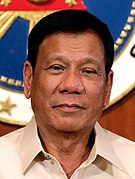
Rodrigo Roa Duterte, also known as Digong, Rody, and by the initials DU30 and PRRD, is a Filipino lawyer and politician who served as the 16th president of the Philippines from 2016 to 2022. He is the chairperson of PDP–Laban, the ruling political party in the Philippines during his presidency. Duterte is the first president of the Philippines to be from Mindanao, and is the oldest person to assume office, beginning his term at age 71.
Imperial Manila is a pejorative epithet used by sectors of Philippine society and non-Manileños to express the idea that all the affairs of the Philippines, whether in politics, economy and business or culture, are decided by what goes on in the capital region, Metro Manila without considering the needs of the rest of the country, largely because of centralized government and urbanite snobbery. Empirical research finds that Imperial Manila and its persistence over time has led to prolonged underdevelopment in Philippine provinces.

Alan Peter Schramm Cayetano is a Filipino politician, lawyer, and diplomat serving as a Senator since 2022 and previously from 2007 to 2017. He was the Senate Minority Leader from 2010 to 2013, and later Senate Majority Leader from 2013 to 2016. He also served as the Representative of Taguig–Pateros from 1998 to 2007 and from 2019 to 2022 and was the Speaker of the House of Representatives from 2019 until his resignation in 2020. He also served as the Secretary of Foreign Affairs from 2017 to 2018 in the cabinet of President Rodrigo Duterte, after unsuccessfully running for vice president in the 2016 elections as Duterte's running mate.

Manuel L. Quezon Avenue, more often called as Quezon Avenue, or simply Quezon Ave, is a 7.1-kilometer (4.4 mi) major thoroughfare in Metro Manila named after President Manuel Luis Quezon, the second president of the Philippines. The avenue starts at the Quezon Memorial Circle and runs through to the Mabuhay Rotonda near the boundary of Quezon City and Manila.
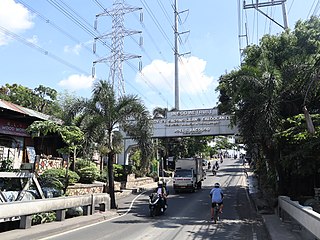
Bagong Silang or Barangay 176 is a barangay of Caloocan, Metro Manila, Philippines. It is known for being the most populous barangay in the Philippines, with a population of 261,729 according to the 2020 census. It is also the northernmost barangay of Metro Manila located in the northern section of the city bordering the province of Bulacan.
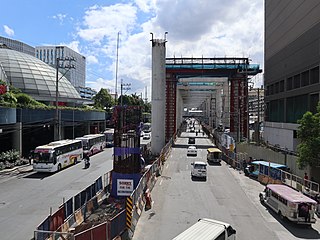
North Avenue is a major road located in Quezon City within the Diliman area of northeastern Metro Manila, Philippines. It runs east–west through barangays Bagong Pag-asa, Project 6, and Vasra, forming the northern part of the North Triangle area. The street is located in Quezon City's mixed-use and government area, known for its malls, condominiums, hotels, and the upcoming QC CBD. It is also home to the SM City North EDSA, Trinoma, and Ayala Malls Vertis North located on the avenue's junction with Epifanio de los Santos Avenue (EDSA). The entire avenue is designated as National Route 173 (N173) of the Philippine highway network.
The following are the events in related to Philippine law in 2016. This includes developments in criminal investigations of national notability.

Rodrigo Duterte became the 16th President of the Philippines on June 30, 2016, succeeding Benigno Aquino III. He was the first president from Mindanao, the first president to have worked in all three branches of government, and the oldest to be elected. He won the election amid growing frustration with post-EDSA governance that favored elites over ordinary Filipinos. His tenure ended on June 30, 2022.
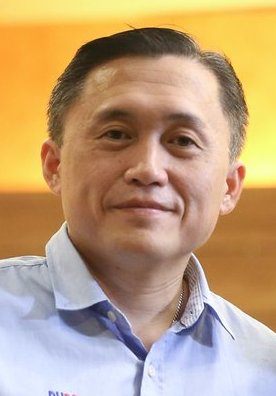
Christopher Lawrence "Bong" Tesoro Go is a Filipino politician serving as a Senator since 2019. He previously served in the Cabinet of President Rodrigo Duterte as Special Assistant to the President and Head of the Presidential Management Staff from June 2016 to October 2018. Go has served as the personal aide and special assistant to Duterte since 1998, back when Duterte was still mayor of Davao City.
In early March 2017, thousands of members of the group Kalipunan ng Damayang Mahihirap and other informal settlers illegally occupied an idle housing project of the National Housing Authority (Philippines) (NHA), in Pandi, Bulacan, in the Philippines.

Bagong Pag-asa, also known as the Magsaysay District, is an administrative division in eastern Metro Manila. It is an urban barangay of Quezon City with low-density housing and is known for its shopping malls, transport hubs and office buildings.
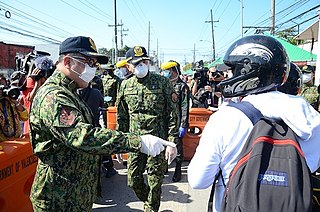
The enhanced community quarantine in Luzon was a series of stay-at-home orders and cordon sanitaire measures implemented by the Inter-Agency Task Force for the Management of Emerging Infectious Diseases (IATF-EID) on the island of Luzon and its associated islands. It is part of the COVID-19 community quarantines in the Philippines, a larger scale of COVID-19 containment measures with varying degrees of strictness. The "enhanced community quarantine" (ECQ) is the strictest of these measures and is effectively a total lockdown.
COVID-19 community quarantines in the Philippines were series of stay-at-home orders and cordon sanitaire measures that have been implemented by the government of the Philippines through its Inter-Agency Task Force for the Management of Emerging Infectious Diseases (IATF-EID).

Both the national government and local governments have responded to the COVID-19 pandemic in the Philippines with various declarations of emergency, closure of schools and public meeting places, lockdowns, and other restrictions intended to slow the spread of the virus.
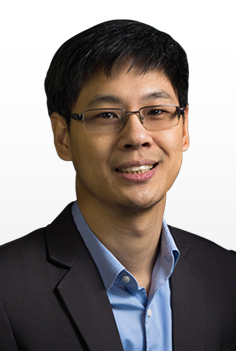
Karl Kendrick Tiu Chua is a Filipino economist who served as the Director-General of the National Economic and Development Authority (NEDA) and Secretary of Socioeconomic Planning under the Duterte administration from 2021 to 2022. He was appointed by President Rodrigo Duterte as acting secretary in April 2020, and became the official secretary on June 2, 2021, succeeding Ernesto Pernia. A former World Bank senior economist, he previously served as an undersecretary of the Department of Finance.
Throughout the COVID-19 pandemic, the national and local governments of the Philippines have coordinated numerous international and domestic evacuations.

The National Task Force to End Local Communist Armed Conflict (NTF-ELCAC) is a task force organized by the government of the Philippines to respond and raise awareness to the ongoing communist rebellion in the Philippines.















